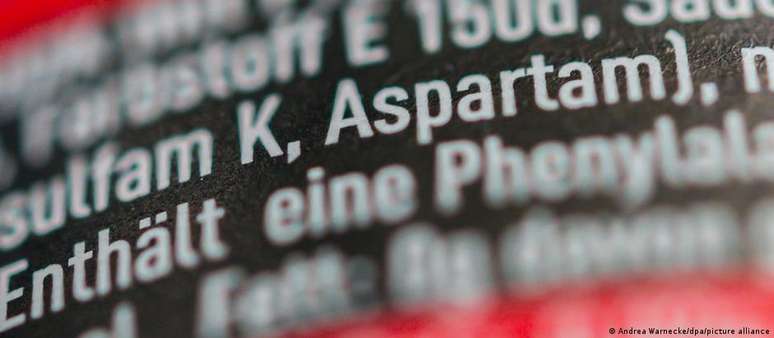The WHO Agency for Research on Cancer classifies the sweetener aspartame, used in soft drinks, as possibly carcinogenic. Other products are already on the list 07) the World Health Organization (WHO).
html[data-range=”xlarge”] figure image img.img-a0db8fd3afe4fcda67b11f34580e690anj1uasm1 { width: 774px; height: 338px; }HTML[data-range=”large”] figure image img.img-a0db8fd3afe4fcda67b11f34580e690anj1uasm1 { width: 548px; height: 240px; }HTML[data-range=”small”] figure figure img.img-a0db8fd3afe4fcda67b11f34580e690anj1uasm1, html[data-range=”medium”] figure image img.img-a0db8fd3afe4fcda67b11f34580e690anj1uasm1 { width: 564px; height: 247px; }HTML[data-range=”small”] .article__image-embed, html[data-range=”medium”] .article__image-embed { width: 564px; margin: auto 0 30px; }
The conclusion is part of a joint analysis conducted by the International Agency for Research on Cancer (IARC), which is part of WHO, and the Joint Committee of Experts of the World Health Organization and the Food Organization of the United Nations. Agriculture (JECFA).
Iarc classified aspartame as “possibly carcinogenic” to humans (group 2B), based on “limited indications in hepatocellular carcinoma”, but the JECFA concluded that the data evaluated do not indicate the need to modify the previously acceptable established up to 40 milligrams for each kilogram of consumer weight.
According to cancer epidemiology professor Paul Pharoah of the Cedars-Sinai Center in Los Angeles, “the general public shouldn’t be concerned about the cancer risk associated with a product classified in group 2B.” This group also includes aloe vera extract and caffeic acid, he points out.
Taking as an example a diet soda containing 200 or 300 milligrams of aspartame, a 70-pound adult would need to consume between nine and 14 cans per day to exceed the acceptable daily intake of this artificial sweetener, the two entities said.
“The limited indications for hepatocellular carcinoma come from three studies” conducted in the United States and ten European countries. These are the only epidemiological studies on liver cancer,” explained Dr Mary Schubauer-Berigan, of the IARC. According to her, further studies are needed to “clarify the situation even more”.
Aspartame has been widely used in various diet or “light” products as a substitute for sugar since the 1980s, such as drinks (Coca Zero, for example), chewing gum, jellies, ice cream, yoghurt, cereals, toothpastes and even in medicines.
It is not the first time that the WHO has considered that there is a risk of cancer in the consumption of a food. The list also includes:
processed meats
Eating processed meats, such as ham, sausage and bacon, increases your risk of cancer, found an IARC and WHO report released in October 2015.
The report was compiled by 22 experts from ten countries, who analyzed more than 800 international studies on meat and cancer. The team classified the processed meat as a “human carcinogen”.
The analysis revealed that there was “sufficient evidence in humans that eating processed meat causes colorectal cancer,” the Lyon, France-based agency said. Meats of this type include sausages, corned beef, jerky, and meat-based sauces.
Therefore, processed meat has been placed in group 1 by the IARC, a category that also includes cigarettes, asbestos and diesel smoke. However, the agency stressed that that doesn’t mean she’s as dangerous as they are.
“For an individual, the risk of getting cancer from eating processed meat remains low, but increases with the amount of meat consumed,” said IARC’s Kurt Straif. Each 50-gram serving of processed meat consumed daily increases the risk of colorectal cancer by 18%, according to the agency.
Red meat
As for red meat, there is “strong evidence of the carcinogenic effects” of consuming the food — mainly in developing colon and rectal cancer, but also in pancreatic and prostate cancer. This includes beef, pork, lamb, mutton, horse and goat. Red meat is therefore in the WHO group 2A of those “probably causing cancer”.
Meat industry groups have criticized the finding, arguing that cancer is not caused by specific foods but by multiple factors.
Doctors and government agencies have long warned that a diet high in red meat is associated with cancer, including colon and pancreatic cancer.
It is not yet clear to what extent red meat may increase the risk of cancer, but a group of researchers at the University of California, USA, has a hypothesis.
They believe that Neu5Gc sialic acid, a sugar molecule found in red meat, stimulates an inflammatory process in the body, which predisposes to the development of cancer.
Neu5Gc occurs naturally in most mammals, but not in humans. The persistent consumption of red meat would lead to chronic inflammation – which, as is known, can trigger tumors – if the human immune system constantly produces antibodies against Neu5Gc, a molecule foreign to the body.
To test the hypothesis, the researchers manipulated laboratory mice to mimic humans, that is, so that Neu5Gc was also a foreign substance to them. Subsequently, the mice were fed Neu5Gc and developed systemic inflammation. Tumor formation increased fivefold and Neu5Gc accumulated in the tumors.
Tests in humans are more complicated, but the team believes the finding could help explain the connection between red meat and other diseases aggravated by chronic inflammation, such as atherosclerosis and type 2 diabetes.
Alcohol
Since 2012, alcohol has been in the same WHO group as processed meat, group 1. This is the cancer-causing group of foods.
Types of cancers linked to alcohol use include bowel, liver, esophageal, and breast cancers.
What’s more: A recent study of alcohol consumption covering 195 countries found that even small amounts of wine or beer occasionally ingested can increase the risk of health problems or death.
And WHO warns: Ethyl consumption is linked to more than 200 chronic diseases and conditions. That list, which includes cancer and cirrhosis, kills 3.3 million people a year, or about 6 percent of the global death toll.
Fried food
Fried foods are in WHO group 2A, “probably causing cancer”. They have been linked to tongue cancer.
Additionally, according to an IARC study published in 2020, trans fatty acids, also found in fried foods, may be associated with a higher risk of developing ovarian cancer.
aloe vera extract
Aloe vera extract, a plant popularly known as aloe vera, is in group 2B, possibly causing cancer.
In Brazil, Anvisa has banned the sale, production and importation of aloe vera-based foods and beverages because there is no evidence of safety in the use of these foods. In foods, this substance can only be used as an additive as a flavouring.
Source: Terra
Ben Stock is a lifestyle journalist and author at Gossipify. He writes about topics such as health, wellness, travel, food and home decor. He provides practical advice and inspiration to improve well-being, keeps readers up to date with latest lifestyle news and trends, known for his engaging writing style, in-depth analysis and unique perspectives.









